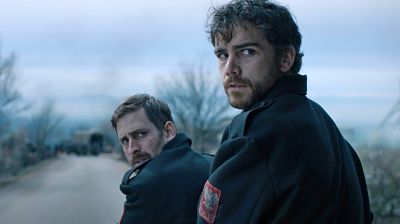
The World Will Tremble: JIFF 2025
Click here if you liked this article 3 ![]()
Date Reviewed: 26/10/2025
We begin in motion — the camera close on Solomon’s (Oliver Jackson-Cohen) face, bloodied lips pressed tight, a heap of motionless bodies forming a crude tableau behind him. A white powder drifts through the air, settling over the dead. In that moment — suspended, terrible — we understand the weight of the title: The World Will Tremble. We have landed in the heart of terror, and from there, the film retraces a story of escape, testimony, and the slow, painful act of bearing witness.
Directed by Lior Geller, the 2025 drama recounts the true story of two Jewish prisoners — Solomon Wiener and Michael Podchlebnik (Jeremy Neumark Jones) — who escaped the Che?mno extermination camp in January 1942 and became the first to bring an eyewitness account of the Holocaust to the wider world. The film opens with a grim vision: a forest of stumps where trees once stood, boots slogging through mud, a yellow Star of David flickering against grey cloth. The foul quiet of digging, the snap of a broken shovel, the whispered resignation — “there’s no choice” — all combine into a visual language of dread.
From that muddy tableau, we follow their arc: forced labour, mass graves, the stench of deception as new arrivals believe the promise of work. The palette is drained of colour — grey and earth tones — while the music hums like an elegy. Yet Geller resists simply relaying horror. He stages small acts of vitality: a deer glimpsed through trees, a stolen pencil passed between men, a murmured, “we have nobody but ourselves.” These moments of humanity don’t lighten the weight; they anchor it.
The acting is quiet, even stiff at times — perhaps intentionally so. In the face of omnipresent death, how loud can one speak? How can urgency exist when the world around you is muted into compliance? This stillness becomes part of the film’s mechanism; it asks us to lean in. Jackson-Cohen’s Solomon limps, his missing shoe a symbol of dislocation, his voice taut with withheld terror. Jeremy Neumark Jones’s Michael is haunted in his glances — the ache of burying his family written in his eyes. Their companion Wolf (Charlie MacGechan) presses on with brute resolve, but in his hollow stare, the film locates another kind of despair.
The non-zone of Che?mno is depicted not as myth but as machinery — the prototype of extermination. Geller’s decade-long research shows in every detail: the leather trench coats, the skull-capped insignia, the stationary truck that doubles as a gas van. The film doesn’t pull back. We’re never far from the bodies, from the sickly hiss of exhaust, from the horror of a girl dragged and shot for sport. Yet the camera shows restraint, avoiding gratuitous spectacle. It refuses to aestheticise suffering, but it doesn’t avert its gaze either. It looks just long enough for the image to scar.
Then comes the arrival of Herbert Lange, commandant of the camp, played by David Kross — his leather trench gleaming under winter light, a skull glinting from his cap. “Your suffering is over,” he says with rehearsed benevolence, promising “good, honest work.” The prisoners almost believe him. It’s a scene that hums with quiet dread — the calm before unthinkable violence. Kross’s performance carries a theatrical edge, his gestures a touch mannered, yet there’s an unnerving precision to it. His politeness curdles into menace; his smile never quite reaches his eyes. There’s a trace of Hans Landa from Inglourious Basterds in his manipulative charm — though Kross’s interpretation leans colder, more bureaucratic than hypnotic.
Technically, the film is meticulous and arresting. Ivan Vatsov’s cinematography renders the camp with bleak anonymity — tree stumps where forests once stood, trucks crawling like corpses through mud, ash drifting like snowfall. A later chase over barbed wire and river is taut yet grounded; the realism only falters briefly in a stray CGI bird and the faint sheen of greenscreen as prisoners and guards jolt inside a truck. Otherwise, it’s pure, tactile cinema: wet night-water, rifle bark, snow-white breath suspended in air. The water sequence, driven by percussion that mimics a frantic heartbeat, makes the struggle visceral — lungs collapsing, bodies shivering, souls almost extinguished. The sound design — gunfire, boots, engines, ragged breath — doesn’t just accompany the image; it immerses us in it.
And then there is Erez Koskas’s score, which lingers long after the credits. Quiet piano chords and swelling strings toll like distant bells — music that threads directly into the body.
When the film closes with the BBC broadcast — the first account of the Holocaust delivered by these men — I found myself sobbing. Rabbi Jacob Schulman (Anton Lesser) murmurs, “The world will tremble,” in a performance so humane it feels whispered to history. Over the credits, archival footage of an elderly Michael Podchlebnik plays — his trembling confession from 1979: “One day at the camp I saw my wife and children… I hugged them in the ditch and begged to be killed, but the German said I still had strength to work.”
At times, the acting feels rigid and the English-German mix awkward, and the pacing drags slightly in the camp’s procedural middle. Yet perhaps that’s part of its truth — the numbing repetition of survival itself.
Grounded in testimony and restraint, The World Will Tremble stands as an act of remembrance and resistance. It asks not only that we look, but that we keep looking. Yes, this is horror — unsensationalised, but still unbearable. It’s the coolness of human cruelty, not the spectacle of it, that chills most.